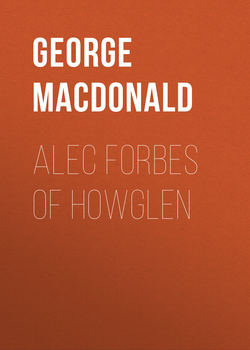Читать книгу Alec Forbes of Howglen - George MacDonald - Страница 5
CHAPTER V
ОглавлениеAnd why should Annie think of the future? The future was not: the present was—and full of delights. If she did not receive much tenderness from auntie, at least she was not afraid of her. The pungency of her temper was but as the salt and vinegar which brought out the true flavour of the other numberless pleasures around her. Were her excursions far afield, perched aloft on Dowie's shoulder, and holding on by the top of his head, or clinging to his back with her arms round his neck, at all the less delightful that auntie was scolding at home? They would have been less delightful if she had thought of the future; but she thought only of the present joy; or rather she took it as it came, and let it play upon her, without thinking about it at all. And if she was late for one of her meals, for Annie had no very correct sense of the lapse of time, and auntie had declared she should go fasting, it was yet not without her connivance that rosy-faced Betty got the child the best of everything that was at hand, and put cream in her milk, and butter on her oat cake, Annie managing to consume everything with satisfaction, notwithstanding the hurdy-gurdy accompaniment of her aunt's audible reflections. And Brownie was always friendly; ever ready on any serious emergency, when auntie's temper was still less placid than usual, to yield a corner of her manger for a refuge to the child. And the cocks and hens, even the peacock and the turkey-cock, knew her perfectly, and would come when she called them, if not altogether out of affection for her, at least out of hope in her bounty; and she had not yet arrived at the painful wisdom of beginning to question motives—a wisdom which misleads more than it guides. She loved them, and that was enough for her. And she would ride the horses to water, sitting sideways on their broad backs like a barefooted lady; for Dowie had such respect for his little mistress, as he called her, that he would never let her get astride "like a laddie," however much she wanted to do so. And when the morning was wet, and the sound of the flails came to her from the barn, she would watch for the moment when her aunt's back would be turned, and then scurry across the yard, like a mouse to its hole; for auntie's first impulse was always to oppose whatever Annie desired. Once in the barn, she would bury herself like a mole in the straw, and listen to the unfailing metronome of the flails, till she would fall so fast asleep as to awake only when her uncomfortable aunt, believing that at last the awful something or other had happened to the royt lassie, dragged her out ignominiously by the heels. But the royt lassie was one of the gentlest of girls, what adventurousness she had being the result of faith, and not of hardihood.
And then came the delights of the harvest-field—soon to become great golden splendours to the memory. With the reapers she would remain from morning till night, sharing in their meals, and lightening their labour with her gentle frolic. Every day, after the noon-tide meal, she would go to sleep on the shady side of a stook, upon two or three sheaves which Dowie would lay down for her in a choice spot. Indeed the little mistress was very fond of sleep, and would go to sleep anywhere; this habit being indeed one of her aunt's chief grounds of complaint. For before hay-time, for instance, when the grass was long in the fields, if she came upon any place that took her fancy, she would tumble down at once, and show that she loved it by going to sleep upon it. Then it was no easy task to find her amidst the long grass that closed over her, as over a bird in its nest. But the fact was, this habit indicated a feebleness of constitution, to which sleep itself was the best restorative. And in the harvest-field, at least, no harm could come of it; for Dooie, as she always called him, watched her like a mother; so that sometimes when she awoke, she would find a second stook of ten sheaves, with a high-uplifted crowning pair above, built at right angles to the first, to shelter her from the sun which had peered round the corner, and would soon have stared her awake.
The only discomfort of the harvest-field was, that the sharp stubble forced her to wear shoes. But when the corn had all been carried home, and the potatoes had been dug up and heaped in warm pits against the winter, and the mornings and evenings grew cold, and, though still friendly to strong men and women, were rather too keen for delicate little Annie—she had to put on both shoes and stockings, which she did not like at all.
So with "gentle gliding," through a whole winter of ice and snow, through a whole spring of promises tardily fulfilled, through a summer of glory, and another autumn of harvest joy, the day drew on when they must leave the farm. And still to Annie it seemed as far off as ever.
